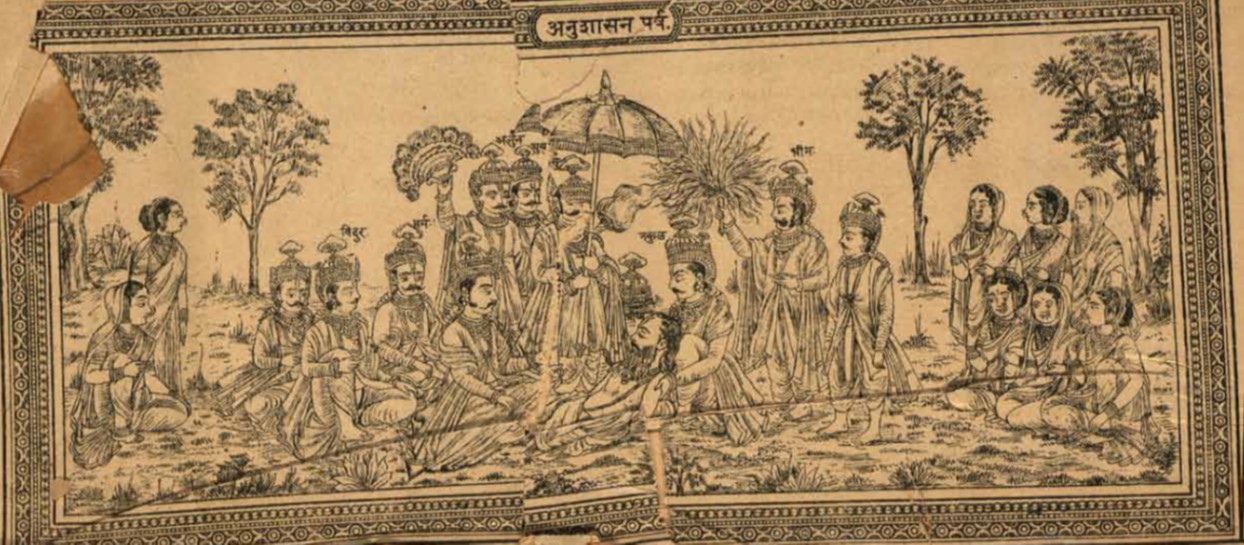No products in the cart.
Anushassana Parva is the thirteenth book of the Mahabharata. It is the book of Instructions. It continues the theme set in Shanti Parva and the dialogue between Yudhishthira and Bhishma goes up to a new level. This Parva consists of 2 upa parvas and about 168 chapters. The summaries of the sub parvas are:
Danadharma Parva
This is the longer of the two Parvas and consists of almost 7500 verses. Bhishma spoke on various types of Dharmas. He further narrated the story of Gautami to Yudhishthira to stress on the ways of getting relieved of a sin. He told Yudhishthira to not curse himself for the war. He said that neither Yudhishthira nor Duryodhana was responsible for the war. It was Time and Fate which was responsible for the death of all the warriors. He further narrated stories of Vishvamitra, Sudarsana and also the conversation between Indra and a parrot to explain the virtues of sympathy and devotion. He also gave the instance of the conversation between Brahma and Vashishta to explain the importance of fate and the human effort. He further elaborated that charity is the virtue of a King who is also intellectual. Only an intellectual King can donate to a Brahmin. He then told Yudhishthira the types of sins based on physical contact and speech. He said that killing others, stealing and cheating with other women were types of sins based on physical contact, while abusing, speaking harsh words, back biting and lying are the four sins done through speech. He said that a King should stay away from both of these kinds of sins. Then Lord Krishna explained the greatness and virtues of Lord Shiva. Sage Vyasa said that Lord Shiva had a thousand names. Bhishma then depicted the importance of pilgrimages and also the duty of a man to protect women.
Bhishma’s teachings in this Parva laid a foundation to the principles of the Hindu religion. He spoke at length about the effect of the various kinds of actions and deeds performed by human beings. He said that the main duties of a Kshatriya was donation and sacrifice. The king should protect all of his subjects. If a king fails to protect any of his subjects, he would be committing a sin. He further again spoke on the importance of donating to a Brahmin. He then spoke of the importance of preceptors and parents. He said that a preceptor is ten times more respectable than a teacher, while a father is ten times more respectable than a preceptor and a mother is ten times more respectable than a father. He said that one should never forget the sacrifices made by his mother. No person in anyone’s life is equal to one’s mother. He further explained in detail about the results of one’s commitment to fasting and the virtue of non-violenece. He said that non-violence is the supreme duty and supreme action that a king should be devoted to. Further, Lord Krishna explained the importance of Lord shiva and his thousand names. By the end of this Parva, all the doubts in Yudhishthira’s minds was cleared by Bhishma with the help of Lord Krishna, Sage Vyasa and some sages. Yudhishthira then went back to Hastinapura along with his family.
Bhishma Svargarohana Parva
This Parva consists of just 2 chapters and about 90 verses only. After reaching Hastinapura, Yudhishthira immediately started carrying out his duties as a King. He allowed everyone to go to their houses. He also sent priceless objects for the funeral of Bhishma. Yudhishthira along with the other Pandava brothers, Kunti, Lord Krishna, Vidura, Satyaki, Vyasa and other sages went to Bhishma who was lying on the bed of arrows. Bhishma spoke to Dhritarashtra and consoled him to forget the incidents of the past. Bhishma was grateful to Yudhishthira for all the arrangements and he then asked for permission from Lord Krishna to abandon his body. Lord Krishna gave him the blessing of going to heaven, the world of Vasus as he had not committed any sin ever. He even took permission from the Pandava brothers and told them to lead a path of truth always as truth is the supreme source of strength in the world. Then, his wounds got cured and he died to begin his journey to heaven. Then, the Pandavas performed his funeral in accordance with the rites. Towards the end of this Parva, Lord Krishna pacified Goddess Ganga, who was deeply in sorrow for the death of her son, Bhishma.

18 Parvas of Mahabharata
1. Adi Parva (the Beginning)
2. Sabha Parva (the Assembly Hall)
3. Vana Parva also Aranyaka-parva, Aranya-parva (the Forest)
4. Virata Parva (Virata)
5. Udyoga Parva (the Effort)
6. Bhishma Parva (Bhishma)
7. Drona Parva (Drona)
8. Karna Parva (Karna)
9. Shalya Parva (Shalya)
10. Sauptika Parva (the Sleeping Warriors)
11. Stri Parva (the Women)
12. Shanti Parva (Peace)
13. Anushasana Parva (the Instructions)
14. Ashvamedhika Parva (the Horse Sacrifice)
15. Ashramavasika Parva (the Hermitage)
16. Mausala Parva (the Clubs)
17. Mahaprasthanika Parva (the Great Journey)
18. Svargarohana Parva (the Ascent to Heaven)






